What is a Lottery?

A lottery is a scheme for distributing money or goods by chance. It is generally governed by law and conducted by a state government or a private corporation authorized to do so. It usually consists of a drawing of numbers to determine the winners, with a prize being awarded to anyone who matches the winning combination. The term lot is also used to refer to an allotment of property, or to a part or share in a distribution of goods, and to a variety of games in which objects are placed together in a receptacle and shaken; the winner is the one whose object falls out first.
In the early United States, public lotteries accounted for a substantial portion of revenue. Lottery proceeds funded canals, bridges, schools, churches, and many other public works projects as well as some private ventures. They were also the source of a number of the founding gifts for American colleges, including Harvard, Yale, and Columbia universities, and they helped finance several of the towns in which the Continental Congress established the American colonies.
It is common for states to organize and regulate their own lottery operations, with a dedicated lottery division that will select and license retailers to sell tickets and redeem winning tickets, train employees of these retailers to use terminals, provide promotional support, pay high-tier prizes to players, and oversee the operation. It is also common for states to levy taxes on lottery ticket sales.